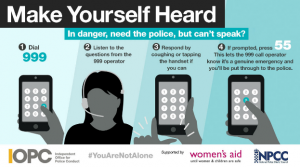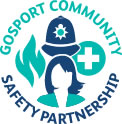Domestic Abuse and Violent Crime

Domestic Abuse can affect anyone. It can happen between you and your partner or ex-partner. Domestic Abuse can also happen between other family members.
Domestic Abuse is a series or pattern of behaviour which can be in the form of a threat of violence, actual violence or abuse. It can also take the form of:
- constant criticism
- pressure
- disrespect
- isolation
- harassment
- constant questioning
- witholding money or other material things
- destroying belongings
- making threats
If you are a victim of Domestic Abuse:
- In an emergency always call 999
- Arrange where you might go if you have to leave urgently
- Find places where you can quickly and safely use the phone
- Keep keys, money and anything else you may need in a safe place, should you have to leave quickly
- Talk to your children, let them know it is not their fault.
- Talk to relatives, friends, your doctor, nurse or others about how you feel
Should you decide to leave home try to contact a specialist organisation such as one of those listed below, they will be able to give you some advice on things you may not have thought of, especially leaving safely.
If you’re at risk of domestic abuse, remember the Silent Solution:
The Silent Solution system enables a 999 mobile caller who is too scared to make a noise, or speak, to press 55 when prompted – to inform police they are in a genuine emergency.
- Dial 999
- Listen to the questions from the 999 operator
- Respond by coughing or tapping the handset if you can
- If prompted, press 55. This lets the 999 call operator know it’s a genuine emergency and you’ll be put through to the police.
For more information go to: Make Yourself Heard
999 calls for people who are deaf:
If you are deaf or can’t verbally communicate, you can register with the emergencySMS service. Text REGISTER to 999. You will get a text which tells you what to do next. Do this when it is safe so you can text when you are in danger.
Housing and Refuge:
If you aren’t safe in your home because of violence, abuse or threatening behaviour, you can get help with a safe place to stay or support to stay in your home safely. We understand that due to self-isolation staying with family and friends might not be an option.
In many situations, we can support you to remain in your own home by supplying and fitting a variety of security measures. Specialist support workers are also available to help ensure you can remain safely at home rather than having to move. Call the Hampshire Domestic Abuse Service Advice Line on 03300 165 112 who will signpost you to the right service for your area.
Find a place in a refuge
You might be able to get safe housing and support in a refuge.
- Refuge services could still be an option for you. You can find out about available refuge places by calling the Hampshire Domestic Abuse Service Advice Line on 03300 165 112.
- You may be able to get free rail travel to take up a place in a refuge. Ask the Hampshire Domestic Abuse Service about this.
- There are some refuge options available to male victims of abuse. You can call the Hampshire Domestic Abuse Service on 03300 165 112, the You Trust on 0800 2346 266 or the Men’s Advice Line on 0808 8010327 for help finding refuge or similar accommodation.
- YOU Trust refuge, Dorset offers a service to support people from LGBT+ and BAME communities, male victims and women with older boys. Call 0800 032 5204 or email youfirst@theyoutrust.org.uk
- Pets: many refuges are unable to accommodate pets. But there are specialist pet fostering services that can provide a solution. For more information please contact the Dogs Trust Freedom Project or Paws Protect.
Ask the council for help
You can ask any council for homelessness help if you’re at risk in your home or can’t stay there because of domestic abuse. The council must help with emergency housing if you’re classed as priority need.
You have an automatic priority need if:
- you have children with you
- you’re pregnant
- you’re a care leaver under 21
Even if none of these apply, the council must help with emergency housing if they think you’re vulnerable. For example, because of the abuse or due to physical or mental health problems.
Your local authority housing department still has a responsibility to give you information about your housing options. You will need to contact the department by phone 02392 545476 or email housingadviceteam@gosport.gov.uk
Domestic Abuse help is available for perpetrators:
Is your family fearful of your behaviour?
The current crisis will be different for every family in Hampshire and for some, this has contributed to an increase in incidents of domestic abuse.
If you need help for yourself or a friend, you can call the confidential Hampshire Domestic Abuse Services Advice Line on 03300 165 112 or the Hampton Trust on 02380 009898.
Information, advice and resources for Domestic Abuse support services:
Aurora New Dawn – 02392 479254 (24 hour helpline 02394 216816)
Childline – 0800 1111
Hampshire Domestic Abuse Advice Line – 03300 165 112
Hampton Trust – 02380 009898
Men’s Advice Line – 0808 8010 327
National Domestic Abuse Helpline – 0808 2000 247
National LGBT+ Domestic Abuse Helpline – 0800 999 5428
NSPCC – 0808 800 5000
Stop Domestic Abuse – 02392 065494


